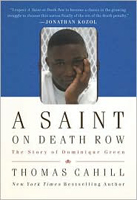By Thomas Cahill (Nan A. Talese/Doubleday, 2009)
Titling this book A Saint on Death Row seems almost inevitably destined to provoke the ire of those who accuse death penalty opponents of naivete. But best-selling author Thomas Cahill's account of Dominique Green's life and death succeeds in drawing readers into a truly amazing story. Cahill got pulled, at first reluctantly, into Green's orbit and, as a result, became an eyewitness to and the perceptive chronicler of Green's extraordinary journey.
Green's youth was marred by "a mother from hell" and nightmarish neglect and abuse. As a teenager he became involved in drug dealing and petty crime, and at the age of 19 he was convicted of murder in what Cahill calls a "monstrously unfair" trial. The subsequent legal proceedings the book painfully records were "tragic farces, cat-and-mouse games in a legal arena run by people who had no intention of giving [Green] justice."
Cahill's book brings readers face to face with the gross miscarriages of justice and the persistent racism connected with the death penalty machinery in the Deep South, particularly in Texas. "The conduct of criminal law in Texas," Cahill writes, "is a judgment not only on Texas but . . . in the end on all Americans." And if that judgment is not motivation enough, the example of the Italian faith community Sant'Egidio-with its involvement in Green's case as well as its leadership in the global fight against capital punishment-ought to further shame us U.S. Catholics out of our complacency into action.
But while Green's story serves to powerfully illustrate the profound immorality of capital punishment in this country, what haunts the reader most is the transformation that occurred in Dominique Green during his 11 years on death row. As Archbishop Desmond Tutu testified after visiting Green, he became "a remarkable advertisement for God." And so he can rightfully be called "a saint on death row."














Add comment